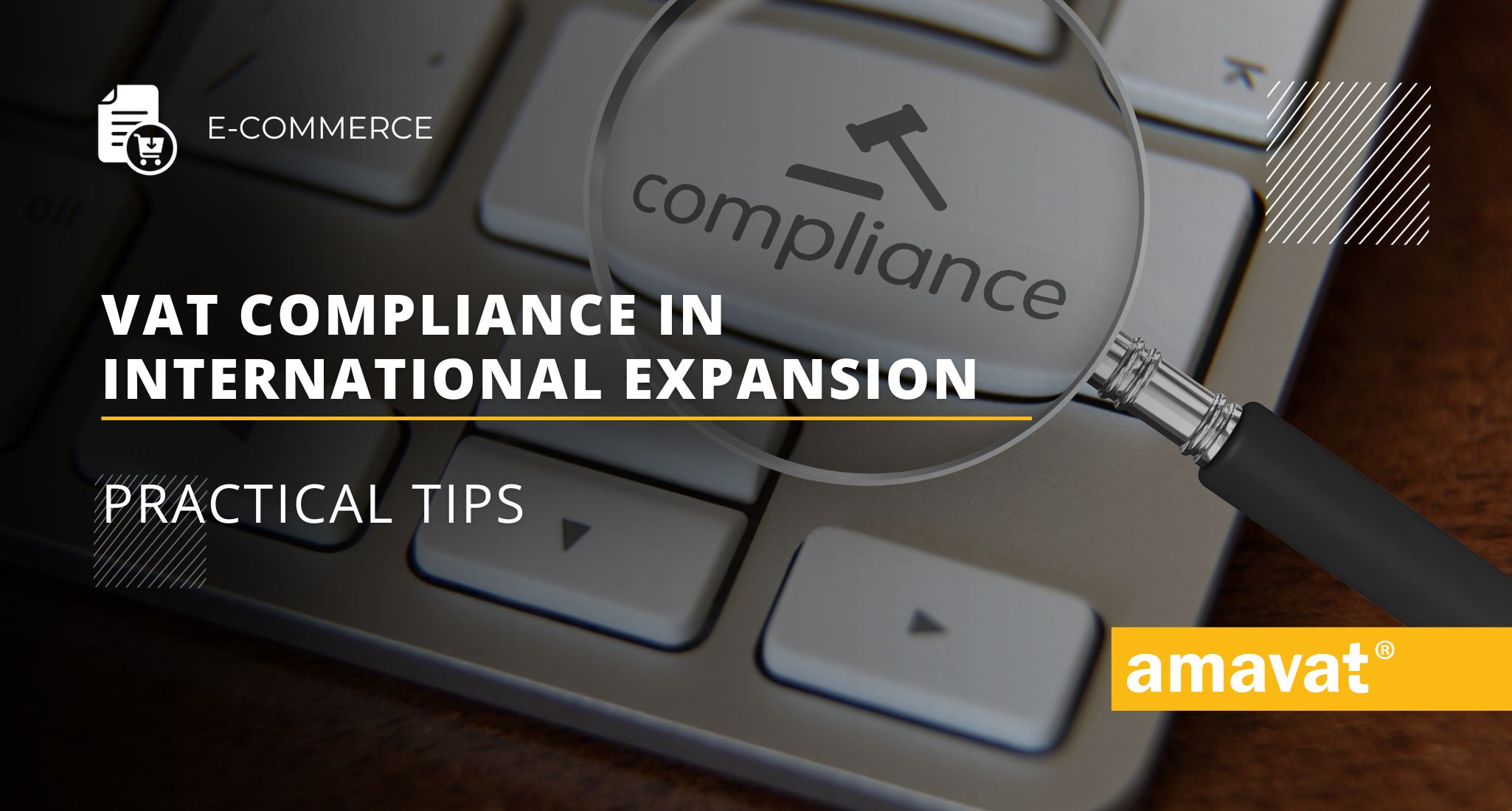VAT Compliance in international expansion: Practical tips
International expansion can open new horizons for companies, but it also presents complex challenges related to compliance with diverse tax regulations. One key aspect requiring attention during international expansion is ensuring compliance with local Value Added Tax (VAT) regulations. Efficient cross-border operations not only facilitate effective market penetration but also minimize legal and financial risks arising from ignorance or non-compliance with important tax regulations.
This article discusses in detail the issues companies should consider when planning and executing international expansion. It highlights the importance of understanding local VAT and VAT-OSS regulations, explains the VAT registration process in new countries, details methods for correct VAT calculation and reporting, and emphasizes the significance of maintaining accurate documentation. Additionally, the article outlines common VAT compliance issues and effective strategies for addressing them. The primary goal of the article is to provide practical advice to help companies avoid tax pitfalls and successfully grow their business internationally.
Understanding local VAT regulations
What is VAT?
VAT, known as Value Added Tax, is a consumption tax paid by the consumer. It is characterized by several principles, such as universality, multi-phase, proportionality, and neutrality. VAT is harmonized at the European Union level, meaning that each member state must adhere to EU legal frameworks, which specify, among other things, a minimum standard VAT rate of no less than 15%.
Differences between countries
VAT rates can vary depending on the country; for example, the lowest rate in the European Union is in Luxembourg (16%), while the highest is in Hungary (27%). There is also a diversity in the rules regarding VAT declarations and settlements, which are determined by local legislations.
Scope of taxation
VAT taxes the supply of goods and services for consideration within a member state’s territory, the export and import of goods, and intra-community transactions. For services, the place of taxation is typically the country where the buyer has their business establishment. However, there are exceptions, such as services related to real estate, which are taxed in the country where the property is located. The reverse charge mechanism, where the obligation to account for VAT is shifted to the buyer, is applied for services provided to businesses within the EU, avoiding double taxation and facilitating international transactions.
VAT accounting in e-commerce
The VAT OSS (One Stop Shop) procedure significantly simplifies VAT accounting for cross-border sales of goods and services to private individuals in the EU. Through this procedure, entrepreneurs can issue invoices with foreign VAT rates but report and pay VAT to their local tax office in Poland, eliminating the need to register for VAT in each EU country where they sell. The VAT OSS procedure also requires submitting a single electronic VAT return for all EU countries where sales occur, further simplifying the process.
New regulations introduced on July 1, 2021, as part of the “E-commerce Package,” are intended to improve VAT accounting for e-commerce in the EU and increase tax collection control. The amended rules replace previous definitions of distance sales of goods with new terms: “intra-Community distance sales of goods (WSTO)” and “distance sales of imported goods (DSIG),” affecting all e-commerce supply chain participants, including online sellers, platforms/markets, postal operators, couriers, customs, tax administrations, and consumers.
Additionally, the Import One Stop Shop (IOSS) procedure exempts goods valued at no more than 150 euros from VAT in all EU member states, simplifying the import process for businesses. These simplifications allow businesses to better manage their VAT obligations and focus on growing their e-commerce operations without worrying about complex tax requirements.
Movement of goods and VAT
Transactions covered by the new changes include various operations such as distance sales of goods within the EU, domestic sales of goods by recognized suppliers, provision of services by EU and non-EU sellers to consumers in the EU, and distance sales of imported goods from third countries or outside the EU. In the context of goods movement, own goods purchased in Poland and transported to a construction site in another EU member state are treated as intra-Community supplies, qualifying for VAT deduction.
Intra-Community acquisition of goods for consideration in Poland (WNT) is recognized as acquiring the right to dispose of goods sent or transported from another member state. However, there are exceptions to recognizing the movement of goods as WNT subject to VAT in Poland, such as the movement of goods to be worked on in Poland and then returned to the member state from which they were originally exported.
The movement of goods between a Polish entrepreneur and their foreign branch within the EU is treated either as an “Intra-Community Acquisition of Goods (WNT)” or an “Intra-Community Supply of Goods (WDT)” depending on VAT regulations. The transfer of funds between different accounts of the same entrepreneur does not change the tax qualification of these movements.
Registering for VAT in new countries
When is registration required?
Registering for local VAT abroad is not always mandatory for e-commerce companies, but there are certain situations where it is necessary. Here are a few such situations:
- Exceeding the sales threshold: In some countries, there is a set sales threshold, after which a company must register locally for VAT. This threshold may vary depending on the country and sales value. Within the EU, this threshold is EUR 10,000 net per year. If a company sells products to a particular country and exceeds this threshold, it will need to register for local VAT.
- Warehousing goods abroad: If an e-commerce company stores its products in a warehouse abroad, it may also require local VAT registration. This is because warehousing goods in a given country can be considered as business activity subject to local tax regulations.
- Selling services to local customers: If an e-commerce company provides services to local customers in a given country, local VAT registration may be required. Examples of such services include legal advice, marketing services, or software provision.
Correct VAT calculation and reporting
VAT rates for different products
VAT rates can vary depending on the country and type of products or services. For example, in France, Spain, Ireland, Luxembourg, and Italy, super-reduced VAT rates of less than 5% apply to specific categories such as books, pharmaceuticals, and medical equipment. It is important to note that each EU member state may apply only one super-reduced rate and a zero rate for a maximum of seven categories of goods and services, which is particularly important when planning international sales.
What documents are needed?
According to Article 112 of the VAT Act, taxpayers are required to keep all documents related to VAT settlements, including issued and received invoices, as well as other accounting documents such as ledgers or receipts. These documents should be kept in a way that allows easy retrieval, which is crucial for ensuring the authenticity of origin, integrity of content, and readability of documentation.
Document storage
VAT documentation must be kept for a period of 5 years, counting from the end of the calendar year in which the tax payment deadline expired, as indicated by Article 106 of the VAT Act. Document storage should ensure easy access and quick retrieval of necessary information. In the event of audits or tax inspections, businesses must be able to promptly present the required documents.
Controls and audits
During tax inspections or audits, it is particularly important that the business can present all required documents confirming the accuracy of VAT settlements. According to regulations, these documents must be stored in a way that allows verification of the authenticity of origin and integrity of invoice content. An example could be the procedure for electronically storing purchase documents, which must meet the conditions specified in the Act, such as ensuring immediate access for tax authorities to electronically stored invoices.
Proper maintenance and storage of VAT documentation is not only an obligation for every taxpayer but also a key element in ensuring compliance with regulations and avoiding potential sanctions.
Common VAT compliance issues
Registration errors
One of the most common problems faced by entrepreneurs is incorrect VAT-EU registration. Companies often make mistakes by selecting outdated registration forms, resulting in application rejection and the need for reapplication. Additionally, entrepreneurs must remember to provide the VAT number with the appropriate country code, which is crucial for the correct settlement of intra-community transactions.
An important aspect is also the lack of possibility for retroactive registration for the VAT-OSS procedure. Therefore, it is essential to plan this procedure well in advance. It is recommended to register for this procedure at the start of distance sales to individual customers outside the company’s home country.
Documentation issues
Irregularities in documentation are another common obstacle. For example, the values of intra-community acquisition of goods (WNT) and supplies (WDT) should be reported in net amounts, and errors in this regard can lead to significant tax discrepancies. Incorrectly stating the taxable amount for WNT or incorrect gross amounts are typical examples that can complicate tax and audit processes.
Potential penalties for incorrect VAT settlements
Accurate VAT settlement is crucial for any entrepreneur operating in the European e-commerce market. One of the most important aspects is the timely submission of JPK_V7 files, which are electronic declarations containing information about the company’s economic transactions. Delays in their submission can result in financial penalties, significantly impacting the company’s finances.
Another important element is the accuracy of VAT amounts reported on invoices. Errors in these amounts can lead to underpayments or overpayments of tax, which is also risky, as tax authorities may impose additional sanctions for inaccuracies in settlements. If the tax office determines that the entrepreneur deliberately manipulated VAT amounts, it can even lead to criminal proceedings.
Delayed VAT payments are another serious issue. If an entrepreneur does not pay the due VAT within the established timeframe, they may be charged interest for the delay. These additional costs can quickly accumulate, further burdening the company’s budget and affecting its financial liquidity.
How to effectively comply with VAT regulations
Automating VAT processes significantly enhances the efficiency of managing tax obligations. Implementing systems like invoice generation and payment tracking automates tasks that traditionally required a lot of time and were prone to errors. This allows companies to respond more quickly to changing market conditions and minimize the risk of payment delays.
Consultations with experts
Collaboration with VAT compliance experts who regularly monitor changes in tax regulations is crucial for maintaining VAT compliance. Multilingual specialists can facilitate communication with officials during tax audits, which is especially important in the context of international operations. Such support ensures that control activities are conducted smoothly and the risk of negative outcomes is minimized.
Regular audits
Conducting regular internal audits allows for early detection of potential irregularities and prevents violations of regulations. These audits should include verifying VAT documentation and checking whether all transactions are correctly reported. This helps businesses avoid costly penalties for errors in VAT registration or settlement, as evidenced by the experiences of firms like amavat®, which represent clients during tax proceedings.
Conclusions
Ensuring compliance with VAT regulations during international expansion is a critical factor that can determine success in the global business arena. Full understanding and and complying with local VAT regulations, effective registration processes, and precise documentation are essential for avoiding tax pitfalls and potential sanctions. Following the guidelines discussed in the article helps companies reduce legal and financial risks, which is extremely important in the context of dynamically changing tax regulations.
Moreover, utilizing modern tools for automating VAT processes and regular consultations with tax experts can significantly improve the efficiency of managing tax obligations. This enables businesses to focus on growing their operations while maintaining full compliance with regulations. Regular audits and appropriate responses to identified irregularities also contribute to the strength and stability of a company in the international market. According to the content of the article, adopting such a strategy ensures not only legal and financial security but also opens up opportunities for dynamic growth and building a lasting competitive advantage in global markets.






